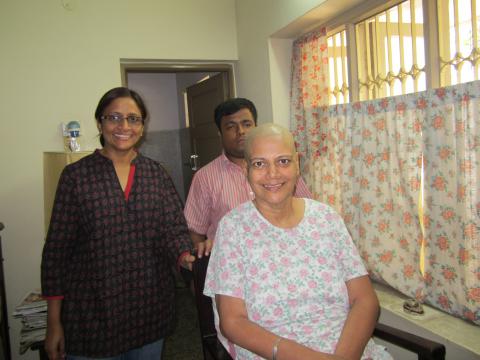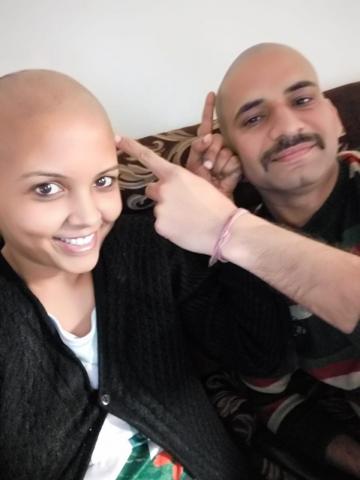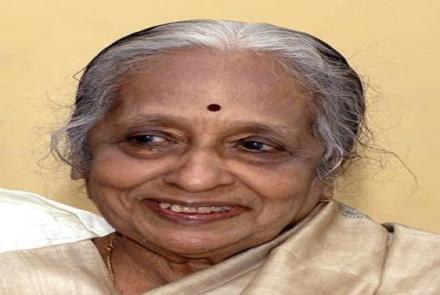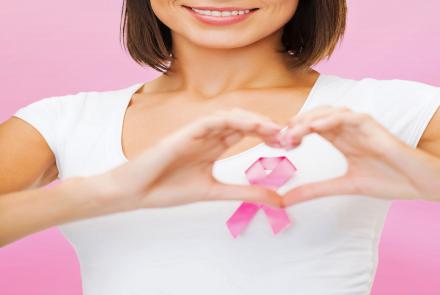
Rebecca D'Souza, clinical psychologist with Nag Foundation, an NGO in Pune working for the welfare of cancer patients, says losing hair due to chemotherapy is one of the biggest fears for women, and suggests ways of dealing with the stress and emotions.
Cancer is a much maligned and dreaded disease partly because of the lack of awareness and partly because of our understanding of the disease and its treatment. Lack of awareness is one of the main reasons for late diagnosis and a lack of understanding of its treatment contributes to increased psychosocial distress.
The Big Fears of Cancer
If you list the fears patients have, on the top of the list is Acceptance of the diagnosis followed by fear of treatment. Acceptance comes because as one of the patients shared ‘everything happened so fast I had no time to think’ or as another shared “I had no choice I wanted to live and acceptance is half the problem solved”.
The next fear is more difficult to face, because it not only changes your appearance, but also is a constant reminder that you are facing the big ‘C’. And is one of the major reasons for refusal of treatment and /or social withdrawal or isolation. It’s a major challenge for most women.
Hair loss is one of the side effects of chemotherapy and often the most devastating one for women. It affects self-esteem and self-confidence.
Coping with hair loss
So how do women face this dread? As you talk to women patients and listen to their stories, you hear the pain, the shame, the guilt, the self pity but you also hear the grit, the determination, the resolve and the acceptance.
From crying uncontrollably, to refusing to look at oneself in the mirror, to donating it as an offering, isolating themselves from friends and family, to making bold statements, it’s a long journey that starts in tears but most often ends in confidence.
The stigma of cancer comes from innocuous statements made by well meaning friends and family, the look of pity, the long silences, advice for just about anything from treatment options, diet, exercise.
What really helps is the silent support, the quiet encouragement, the listening and just being available.
Hair is considered the crowning glory of ourselves; it adds to our self worth, it gives us an identity. Most of us are always concerned about our hair; either it’s too straight or its too curly, its falling or thinning. We go through life wishing for longer, thicker, silkier hair. It makes us more feminine or more womanly.
When Mrs A was breaking down every time she saw tufts of hair in the bathroom, on the bed, on the pillow, her 18-year daughter went out and shaved her hair. Her going bald gave Mrs A the courage to go bald herself. A small gesture but went miles along.
Usha Jerome's friend Jacqueline Colaco went bald in solidarity

Shilpa's husband went bald to support his wife's bald look

Talking about how they feel about hair loss is important, their emotions affect the way their body heals. Expressing their pain allows for one to naming the emotions. Often patients experience a cluster of emotions from anger to guilt, from shame to sadness, talking to someone helps one sort the emotion, put it into perspective, release the tension and very often helps accept and get answers. What is important is choosing the right person to talk to. An impartial ear or a neutral person outside the situation is a good choice rather than a family member or a friend. Listening to another survivor who has been there, done that also helps new patients cope with the trauma of hair loss.
Wearing wig, scarf, hat
Wearing a wig or a stylish scarf or a hat helps women go back to into the world that they feel may not accept them or batter them with questions. Wearing a wig has made it easier for women to be accepted in the workforce, to get back to life as it was even during chemotherapy.
Saroj, Meenakshi and Shachi on scarves, hats and wigs
The good news is that advancements in chemotherapy and inventions are making it easier for women to go through treatment.
REMEMBER
- Talk to someone about what you are feeling
- Consider wigs or scarves
- Ask your doctor about scalp cooling
- Talk to a survivor about their experience
- Opportunity to change your appearance
- Be patient
- Hair grows back in most cases
Rebecca is a clinical psychologist at Nag Foundation

















